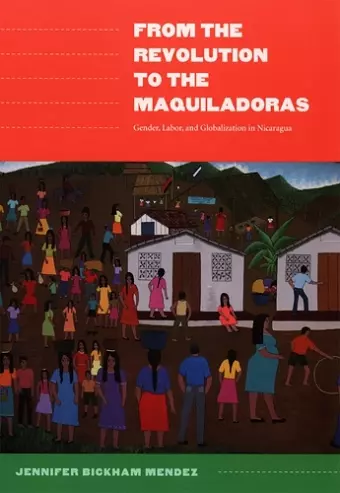From the Revolution to the Maquiladoras
Gender, Labor, and Globalization in Nicaragua
Jennifer Bickham Mendez author
Format:Hardback
Publisher:Duke University Press
Published:7th Sep '05
Currently unavailable, and unfortunately no date known when it will be back

How grassroots organizations tap into global networks and how gender plays into transnational political practices, addressing these issues through extended ethnographic research
From the Revolution to the Maquiladoras is a major contribution to the study of globalization, labor, and women’s movements. Jennifer Bickham Mendez presents a detailed ethnographic account of the Nicaraguan Working and Unemployed Women’s Movement, “María Elena Cuadra” (mec), which emerged as an autonomous organization in 1994. Most of its efforts revolve around organizing women workers in Nicaragua’s free trade zones and working to improve conditions in maquiladora factories. Mendez examines the structural and cultural elements of mec in order to demonstrate how globalization affects grassroots advocacy for social and economic justice. She argues that globalization has created opportunities for new forms of organizing among those local populations that suffer its effects and that mec, which has forged vital links with transnational feminist and labor groups, exemplifies the possibilities—and pitfalls—of this new type of organizing.
Mendez draws on interviews with leaders and program participants, including maquiladora workers; her participant observation while she worked as a volunteer within the organization; and analysis of the public statements, speeches, and texts written by mec members. She provides a sense of the day-to-day operations of the group as well as its strategies. By exploring the tension between mec and transnational feminist, labor, and solidarity networks, she illustrates how mec women’s outlooks are shaped by both their revolutionary roots within the Sandinista regime and their exposure to global discourses of human rights and citizenship. The complexities of the women’s labor movement analyzed in From the Revolution to the Maquiladoras speak to social and economic justice movements in the many locales around the world.
“Jennifer Bickham Mendez provides a nuanced ethnography that does not simply assert the gendered intricacies of local and global political-economic processes but artfully traces their unfolding in the contemporary Nicaraguan context. She reveals the organizational and discursive possibilities presented through the international feminist and human rights movements and also elucidates the constraints and tensions across local political hierarchies of organized labor, state bureaucracies, and a national/regional women’s movement fractured along class lines. Mendez’s analysis of MEC and the wider regional Network provides a powerful lens on the range of tactics, coping mechanisms, and organizational strategies currently being enacted on a stage that is simultaneously local, regional, and global.”—Carla Freeman, author of High Tech and High Heels in the Global Economy: Women, Work, and Pink-Collar Identities in the Caribbean
“This is a compelling case study of a women’s NGO organizing women workers in a Free Trade Zone in post-Sandinista Nicaragua. Jennifer Bickham Mendez’s account reveals the challenges faced by a feisty NGO trying to survive and maintain its autonomy—from capital, the state, and the good intentions of international donors. It is a testimony to the strengths, but also the fragility, of civil society in today’s struggling democracies.”—Jane S. Jaquette, coeditor of Women and Democracy: Latin America and Central and Eastern Europe
“From the Revolution to the Maquiladoras is written on the basis of ethnographic research and the author’s personal involvement over the course of a decade; it is therefore a historical chronicle, an investigation into the operations of a unique women’s organization, and a personal testimony.” -- Patricia Fernández-Kelly * Signs *
“A must-read text for anyone interested in contemporary women’s movements, labor organizing, and issues of transnationalism and globalization in Latin America and elsewhere.” -- Lynn Stephen * American Ethnologist *
“This well-written, well-organized and accessible book is exemplary in its ability to locate a case study within a larger context and reveal the connections between day-today organizing and the transnational links and multiple global spheres stimulated by globalization.” -- Norma Stoltz Chinchilla * Contemporary Sociology *
ISBN: 9780822335528
Dimensions: unknown
Weight: 531g
304 pages